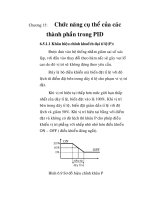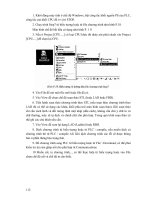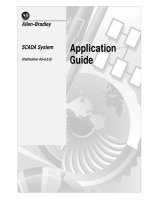15 diagnostics troubleshooting Training PLC Allen Bradley
Bạn đang xem bản rút gọn của tài liệu. Xem và tải ngay bản đầy đủ của tài liệu tại đây (527.95 KB, 19 trang )
DAY 4
SESSION 3
15-1
DIAGNOSTICS & TROUBLESHOOTING
Diagnostics & Troubleshooting
6 – 10 December 2010
FAULT OVERVIEW
• Fault is unexpected condition that had bad effect to the
process
• Whether it cause a major problem or minor
• Depending on the application, it may not make all faults to shut
down your entire system
• It can use a fault routine to clear a specific fault and let at least
some of the system continue to operate
15-2
• And also can be used to monitor a minor fault which is will not
shutdown the controller
Diagnostics & Troubleshooting
6 – 10 December 2010
FAULT CONDITION
• According to the effect/severity caused by the fault it can be
classify to two condition
• Major Fault
• Minor Fault
• Major Fault is a fault condition that severe enough for the
controller to shutdown
15-3
• Minor Fault is a fault condition isn’t too severe for the
controller to shutdown
Diagnostics & Troubleshooting
6 – 10 December 2010
MAJOR FAULT CONDITION
• By what does it caused, Major Fault can be classified to three
condition
• First is execution fault of an instruction
• Second is system fault including power loss, IO failure, task
watchdog,mode change, and motion axis
15-4
• The last is user defined error or fault
Diagnostics & Troubleshooting
6 – 10 December 2010
MINOR FAULT CONDITION
• Minor Fault classify as the Minor system Fault and Minor
instruction Fault
• System Fault
15-5
• Periodic Task Overlap
• Load from nonvolatile Memory
• Problem with serial port
• Low Battery
• Instruction Fault
Diagnostics & Troubleshooting
6 – 10 December 2010
MONITORING MINOR SYSTEM
FAULT
• Periodic Task Overlap: Monitoring the 6 bit from FAULTLOG
object MinorFaultBits Attribute
• Load from Nonvolatile memory: Monitoring the 7 bit from
FAULTLOG object MinorFaultBits Attribute
• Problem with the serial port: Monitoring the 9 bit from
FAULTLOG object MinorFaultBits Attribute
15-6
• Low Battery: Monitoring the 10 bit from FAULTLOG object
MinorFaultBits Attribute
Diagnostics & Troubleshooting
6 – 10 December 2010
MONITORING MINOR
INSTRUCTION FAULT
• Monitoring Minor Instruction Fault involving S:MINOR ,Minor
Fault Flag status register, for the Minor Fault Condition
15-7
• When S:MINOR set, which that mean an Minor Fault happened,
detail fault information is catch by GSV command
Diagnostics & Troubleshooting
6 – 10 December 2010
CLEAR FAULT VIA MENU
• Saat processor mengalami fault, harus dicarikan dan dikoreksi
penyebabnya sebelum mencoba menghilangkan fault.
• Jika penyebab belum ditemukan, processor akan berperilaku
yang tidak diharapkan.
• Jika processor MicroLogix 1000 atau ControlLogix 500
mengalami fault, harus dihilangkan fault-nya sebelum program
jalan. Untuk menghilangkan fault pada processor, pilih Comms
> Clear Fault.
15-8
FAULTED
Diagnostics & Troubleshooting
6 – 10 December 2010
15-9
CLEAR FAULT VIA STATUS
DISPLAY
Diagnostics & Troubleshooting
6 – 10 December 2010
15-10
STATUS DISPLAY(1)
Diagnostics & Troubleshooting
6 – 10 December 2010
15-11
STATUS DISPLAY(2)
Diagnostics & Troubleshooting
6 – 10 December 2010
CONTROLLOGIX I/O ERROR(1)
• Karakter xx dalam kode menyatakan nomor slot dalam
hexadecimal(h).
• Jika slot secara eksak tidak bisa ditentukan,karakter xx menjadi
1F.
• Kebanyakan fault I/O dapat direcoveri, dengan cara
mendisable slot(xx) yang bersangkutan pada user fault
routine.
15-12
• Jika tidak didisable, processor akan fault pada akhir scan.
• Modul I/O yang rusak dapat menyebabkan processor
mengindikasikan bahwa error ada pada slot 1 meskipun modul
yang rusak tidak terinstalasi pada slot 1.
Diagnostics & Troubleshooting
6 – 10 December 2010
15-13
MAJOR AND MINOR CODE
REFERENCES
Diagnostics & Troubleshooting
6 – 10 December 2010
15-14
MAJOR FAULT TYPE AND CODE (1)
Diagnostics & Troubleshooting
6 – 10 December 2010
15-15
MAJOR FAULT TYPE AND CODE (2)
Diagnostics & Troubleshooting
6 – 10 December 2010
15-16
MAJOR FAULT TYPE AND CODE (3)
Diagnostics & Troubleshooting
6 – 10 December 2010
15-17
MINOR FAULT TYPE AND CODE (1)
Diagnostics & Troubleshooting
6 – 10 December 2010
15-18
MINOR FAULT TYPE AND CODE (2)
Diagnostics & Troubleshooting
6 – 10 December 2010
NEXT
SESSION 4
15-19
TRAINING DISCUSSION
Diagnostics & Troubleshooting
6 – 10 December 2010









